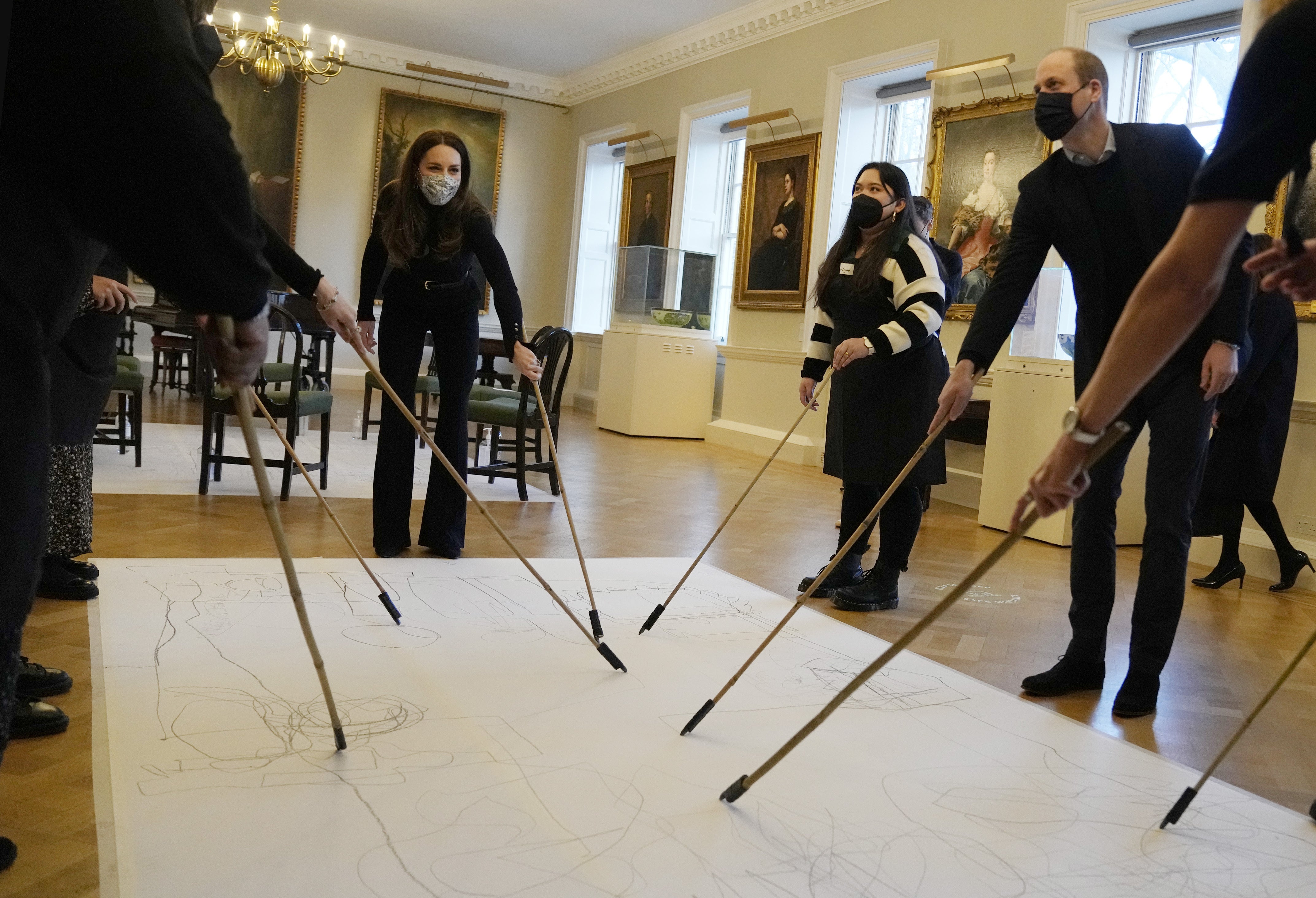Doodling duke and duchess join art session at Foundling Museum
The royal couple also chatted with former champion hurdler Kriss Akabusi about his experience of leaving care at the age of 16.

The Duke and Duchess of Cambridge helped make a giant royal doodle from a distance as they took part in an ice-breaker art session.
William and Kate, who were visiting the Foundling Museum in central London were armed with three-foot-long sticks with pencils at the end as they joined women who had previously been in care to create the paper masterpiece.
Kate – who has an MA in Art History from St Andrews University – laughed out loud as she struggled with the task, which involved drawing on a large canvas flat on the floor in front of them without looking down.
William laughed and said: “I enjoyed it. The kids would really enjoy that.”
Viewing the creation, he added: “That’s beautiful.”
The museum said afterwards it would keep the paper and store it safely until it decided what to do with it, but that it would not be sold.
The Cambridges, who were visiting on Wednesday to learn more about the care sector and the challenges those leaving it face, heard from former athlete Kriss Akabusi, poet Lemn Sissay and writer Allan Jenkins about their experiences of growing up in care.
Olympic medal-winning runner Mr Akabusi described how he enjoyed the stability of care, saying: “It was a saviour for me.”
But he told how leaving care at the age of 16 was “very traumatic”, with Kate replying: “You are petrified leaving for independence.”
The duchess asked the 400m hurdler if it had affected his relationships and Mr Akabusi, with his distinctive laugh, replied: “Yes, but I am a loner.”
He added: “Now aged 63 there is no stigma attached when I say I was brought up in care but there was a stigma when I was 16.”
Mr Akabusi’s parents returned to Nigeria when he was four, leaving him and his younger brother alone in the UK.
After moving around foster placements, he eventually settled in a children’s home, and joined the Army after leaving at 16.
Kate, who last year set up her Centre for Early Childhood, and William also joined a roundtable discussion with charity bosses who discussed homelessness, mental health impact and helping young people in care who slip through the cracks.
The duchess asked the experts: “From your experience, what makes the difference between a young person succeeding after leaving foster care and when they do not?”
They heard about the challenges young people experience when they move home frequently and are sometimes exploited by the criminal world.
William added: “If you keep moving a child around when they are an adult their relationships are so short and shallow.”
Kate said she was concerned that without providing stable homes for children they risked being moved around and having to “tell their story again and again”.
The duke added: “That may become emotionally exhausting to tell the story again and again.
“We’ve had that in the mental health side of things, people end up on the street, go through hoops and hurdles, tell so many people in authority and nothing changes.
“You have to get to them a lot earlier so they don’t have to keep doing this.”
The couple also said they were worried about the “consistency in care”.
The Foundling Museum tells the history of the Foundling Hospital, the UK’s first children’s charity which was founded in 1739 as a home for children whose mothers could not keep or care for them.
The museum delivers training, mentorship programmes and creative projects, led and developed by contemporary artists, writers and musicians, to help improve the lives of young people with experience of the care system.
Its Tracing Our Tales initiative gives young adults from London who have been in care life skills and paid employment to devise and deliver family workshops at the museum.
William made no response when he was asked “Do you support Prince Andrew?” by a TV news crew as he left the engagement.
The duke leaned closer to hear but then walked past without commenting.
Bookmark popover
Removed from bookmarks